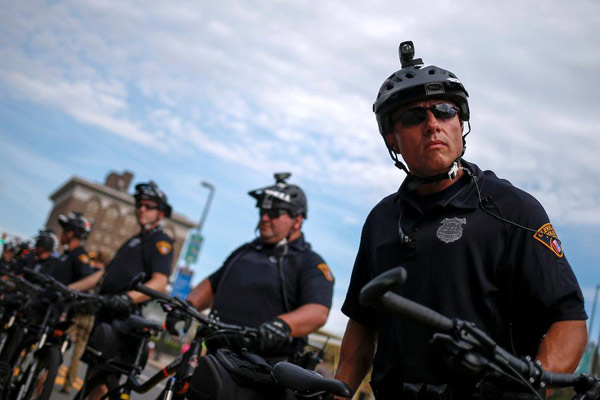Race relations in the US disheartening
By Harvey Dzodin (China Daily) Updated: 2016-07-18 11:04
 |
|
Police officers use bicycles to create cordons around a protest march by various groups, including "Black Lives Matter" and "Shut Down Trump and the RNC," ahead of the Republican National Convention in Cleveland, Ohio, US, July 17, 2016. [Photo/Agencies] |
Three police officers were killed, several others injured on Sunday in a shooting incident in Baton Rouge, the capital city of the US state of Louisiana. It is a second shocking case after the shooting deaths of five police officers in Dallas and the police killings of black men in Louisiana and Minnesota.
The recent horrific race-related incidents have brought into sharp focus how little has been achieved in socio-racial relation in the country. In many ways, baseball great Yogi Berra nailed it when he said, it's a case of "deja vu all over again".
Since its founding, the US has wrestled with racism, and the events of recent days and the many outrages of recent years show this struggle is far from being over.
Before the birth of the US, the economy of the southern part of this vast land depended on slavery. The US Constitution recognized slaves as only three-fifths of a human being. The Supreme Court's Dred Scott decision in 1857, the catalyst for the American Civil War four years later, permitted slavery in US territories. And while the 13th Amendment to the Constitution abolished "slavery" and "involuntary servitude" in 1865, the year the war ended and then president Abraham Lincoln was assassinated, starting in the 1880s the so-called Jim Crow laws legalized segregation between blacks and whites in the southern states and cities. These laws were abolished in the 1950s and 1960s, but prejudice remained and remains.
Many blacks in the southern US moved to northern states in search of better economic opportunities but extant laws and informal practices pushed them into ghettos — which Bob Marley aptly called "concrete jungles". They were like pressure cookers without a safety valve. Explosions were inevitable.
More than 200 people died in race riots between 1964 and 1971. Riots in Los Angeles in 1965 left 34 dead and began after a white policeman stopped a black driver at a traffic crossing. Most riots began when blacks were confronted by white police officers. In 1967, there were at least 159 race-related riots. In 1968 it seemed the entire country was ablaze after the assassination of Martin Luther King Jr.
The report of the Kerner Commission formed by former US president Lyndon Johnson concluded: "Our Nation is moving toward two societies, one black, one white — separate and unequal." The report said disturbances were not a conspiracy, but a result of people being "furious about facing constant discrimination when seeking new employment, trying to find a place to live, or, worst of all, interacting with hostile law-enforcement officials".
So the happenings in Dallas, Texas, Saint Paul, Minnesota, and Baton Rouge, Louisiana, are consistent with the long arc of history. The pressure cooker is still boiling.
It's true that progress has been made. After all, we have a black president, and black Supreme Court judges, cabinet members, senators and congressmen. Blacks serve in leadership positions in the public and private sectors. But that's a thin veneer.
And the outlook is disheartening. Economic disparities continue. Assets of the average white family are 10 times that of blacks.
A Pew poll released in late June casts further gloom. About 61 percent of blacks say race relations are bad, and 43 percent foresee changes needed to give blacks equal rights with whites will be made. And blacks say they are treated less fairly than whites by police (84 percent), in the courts (76 percent) and when applying for a loan (66 percent). There is clearly a great divide.
Congress won't help. It is dysfunctional in the extreme. The Supreme Court has backtracked on many rights enjoyed by blacks.
No one can say whether this will be a long hot summer but I know that presumptive Republican presidential candidate Donald Trump will do his best to demagogue issues and to continue to rail against Mexicans, Muslims and Jews — as well as others. Is he pouring gasoline on a smoldering fire? We will have to wait and see.
The author is a senior adviser to Tsinghua University and former director and vice-president of ABC Television in New York.












